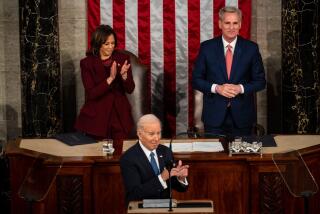Washington Gridlock
- Share via
In his report to Congress on the Geneva summit meeting, President Reagan said, “Quick fixes don’t fix big problems.” The same dictum applies equally to the plight of the U.S. budget, tax and trade systems.
While attention was centered on Geneva, Washington lost ground in attempts to reform the tax system and to deal realistically with $200-billion annual budget deficits. The trade deficit continues to run at a record pace.
The problem is that Washington is trying to solve deeply complex and long-range problems with political Band-Aids that in some cases will serve only to make the dilemma worse.
The Gramm-Rudman bill to eliminate annual budget deficits by 1991 cannot succeed without cutting deeply into both defense and domestic programs. But factions in Congress now have protected so many categories of spending that the measure cannot possibly work the way its sponsors contend it will. But this approach was doomed from the start. Automatic, arbitrary cuts of the kinds proposed by the sponsors of the measure, Sens. Phil Gramm (R-Tex.) and Warren B. Rudman (R-N.H.), do nothing but allow evasion of leadership and responsibility.
The main thing that can be said about the tax-reform plan now before the House of Representatives is that it is not tax reform. The committee has made some improvements in the President’s program, one of the most notable the imposition of a strong minimum tax on corporations and wealthy individuals. The problem is not that too many people pay too much tax, but that the burden is not fairly distributed, and the bill that left the Ways and Means Committee for action by the House would do too little to restore balance to that distribution.
The committee has conducted a vast giveaway bazaar for some special interests, and has heavily socked others. Many of the inequities and subsidies of the present system would remain in revised form. The measure would not simplify the tax system. Worse yet, it would fail to produce the incentives that are needed to encourage savings and to promote the long-term investment that the nation must have to compete in the global marketplace.
The tax-reform plan was flawed from the start by offering a bonanza of personal tax cuts at a time when the nation’s most pressing need is for more revenue. The President blindly refuses to consider any tax increase. Democrats, their eyes on the 1988 elections, are not about to take the blame for higher taxes.
So there is political and ideological gridlock on these issues in Washington, and something dramatic is needed before the nation can begin to cope with the central problems of the economy. Clearly the time has come for a domestic summit meeting of the President, congressional leaders, economists, business people and industrialists, labor officials and others who can contribute to putting together a rational framework into which to put taxes, budget and trade.
The President says that he sees the Soviet Union with a new sense of realism. He needs to take the same approach on the economy. The nation requires a reformed tax system that will raise the revenue to fit national needs. It needs a set of tax and other policies for industry that will make American business productive and competitive. It needs discipline and leadership.
Such a summit could give the President a new sense of realism about domestic problems, but that makes the guest list for the summit as crucial as the list of staff advisers and outside specialists in foreign affairs who worked with him in preparation for the summit. It must include people with the stature and the perseverance to persuade the President that, at home as much as abroad, “quick fixes don’t fix big problems.”
More to Read
Get the L.A. Times Politics newsletter
Deeply reported insights into legislation, politics and policy from Sacramento, Washington and beyond. In your inbox twice per week.
You may occasionally receive promotional content from the Los Angeles Times.









